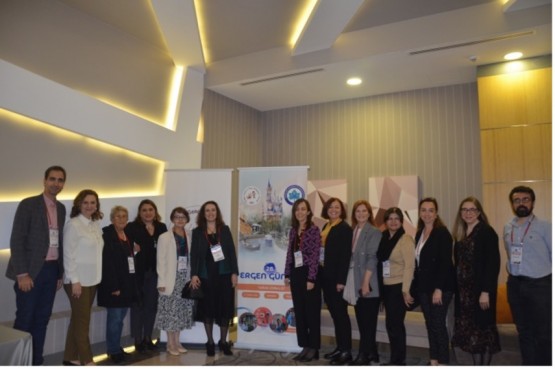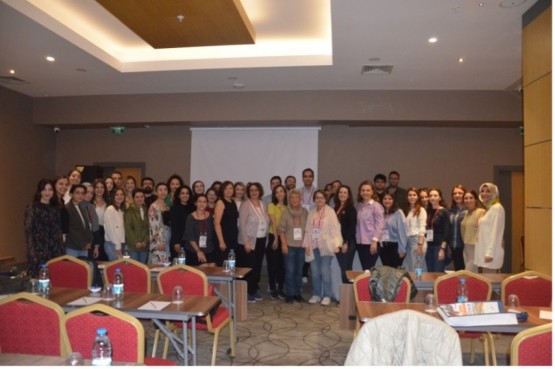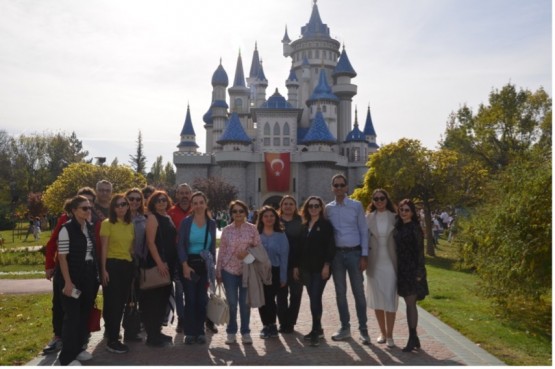28th Annual Adolescent Psychiatry Symposium in Eskisehir, Turkey
By: Murat Eyüboğlu, M.D. Associate Professor of Child and Adolescent Psychiatry, Eskisehir Osmangazi University School of Medicine, Eskisehir, Turkey.
The 28th Annual Adolescent Psychiatry Symposium was held in Eskişehir, Turkey, on November 2-4, 2023, under the expert guidance of co-chairs Füsun Çuhadaroğlu and Murat Eyüboğlu. This year’s symposium focused on peer bullying, a subject of growing concern in the contemporary literature of adolescent psychology and education. The event drew approximately 200 attendees from a variety of disciplines, including psychiatrists, educators, psychologists, and social workers, highlighting the symposium’s commitment to a multidisciplinary approach.

A distinguished gathering at the 28th Adolescent Symposium. From left to right: Engin Ozakin, Vice Dean of Eskişehir Osmangazi University School of Medicine; Atilla Özdemir, Dean of Eskişehir Osmangazi University School of Medicine; Füsun Çuhadaroğlu, Co-chair of the Symposium; Murat Eyüboğlu, Co-chair of the Symposium; Damla Eyüboğlu, Symposium Secretary.

Organising Committees
The discussions during the three-day program were multifaceted, focusing primarily on the clinical manifestations of peer bullying. The experts presented their research and insights, shedding light on how bullying behaviors manifest in various environments and the profound psychological, social, and educational impacts they have on young individuals. These sessions illuminated the complex dynamics of bullying, offering a nuanced understanding of its causes, effects, and the varying forms it can take. A significant section of the symposium was dedicated to exploring and evaluating intervention programs and educational practices aimed at combating bullying. There was a consensus on the need for proactive and multifaceted strategies that involve not just the victims and perpetrators of bullying, but also parents, teachers, and the wider school community. Innovative approaches to intervention, such as peer-led initiatives and school-wide anti-bullying policies, were discussed. These sessions underscored the importance of creating environments that not only discourage bullying but also promote empathy, respect, and a culture of open communication. There was also a session with high school students where they shared their opinions and experiences on bullying and contributed with their ideas for the future.
The issue of cyberbullying was a focal point of this year’s symposium program, reflecting the changing landscape of adolescent interaction in the digital age. The rise of social media and online communication platforms has given bullying a new, more insidious dimension, often harder to detect and address. The symposium tackled these challenges, with discussions on the unique aspects of cyberbullying and its psychological impact on adolescents.
Another hallmark of the symposium was the emphasis on interdisciplinary cooperation. The exchange of knowledge and perspectives among professionals from various fields fostered a collaborative atmosphere that is essential in addressing complex social issues like peer bullying. This collaboration led to holistic views and approaches integrating psychology, education, social work, and technology.

Participants at the closing ceremony

Attendees of the 28th Adolescent Symposium enjoying a city tour of Eskişehir
The symposium concluded with a future perspective, emphasizing the need for ongoing research, policy development, and community involvement in combatting peer bullying. The importance of continued interdisciplinary collaboration was underscored.
At the closing ceremony, the Symposium Research Award was presented to Psk. Dr. Sevgi T. Aytekin for her research titled ‘Investigation of School Factors Affecting Peer Bullying.’ The Symposium was closed by the invitation to meet in Ankara for the next Adolescent Psychiatry Symposium in 2024.
This article represents the view of its author(s) and does not necessarily represent the view of the IACAPAP's bureau or executive committee.

